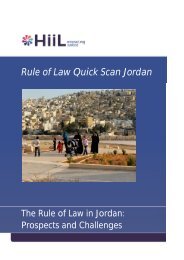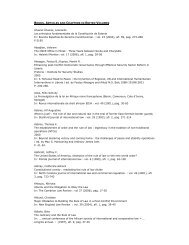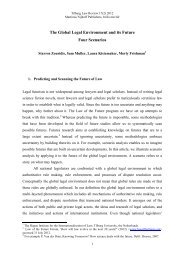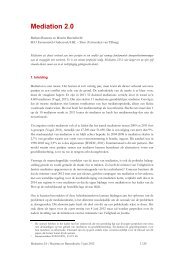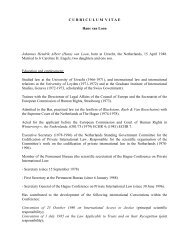Justitie en politie in buitenlandse missies 4 | 10 - HiiL
Justitie en politie in buitenlandse missies 4 | 10 - HiiL
Justitie en politie in buitenlandse missies 4 | 10 - HiiL
Create successful ePaper yourself
Turn your PDF publications into a flip-book with our unique Google optimized e-Paper software.
Summaries119what is happ<strong>en</strong><strong>in</strong>g and wh<strong>en</strong>. This implies certa<strong>in</strong> flexibility <strong>in</strong> theexecution of a project, both time and cont<strong>en</strong>t wise. And it meansthat the northern partner recognizes that the southern partner doesnot exist merely for the northern project. Otherwise it will lead to asouthern partner that says ‘yes’ and picks the best cherries, but forthe rest does ‘no’ and obstructs where possible.The <strong>in</strong>tegration of police and judicial cooperation <strong>in</strong>to theEuropean Union’s foreign policyC. FijnautCross-border police cooperation, <strong>in</strong> any case aga<strong>in</strong>st politicaladversaries, has always be<strong>en</strong> an important compon<strong>en</strong>t <strong>in</strong> the foreignpolicy of European states, especially wh<strong>en</strong> police forces wereestablished <strong>in</strong> their colonies dur<strong>in</strong>g the n<strong>in</strong>ete<strong>en</strong>th and tw<strong>en</strong>tiethc<strong>en</strong>turies. Aga<strong>in</strong>st this background it was quite astonish<strong>in</strong>g,because very artificial, that <strong>in</strong> the Maastricht Treaty a rather cleardist<strong>in</strong>ction was made betwe<strong>en</strong> a second pillar (foreign and def<strong>en</strong>sepolicy) and a third pillar (justice and home affairs, later on calledpolice and judicial cooperation). Over the years this gap has be<strong>en</strong>bridged from two sides: on the one side the geographical <strong>en</strong>largem<strong>en</strong>tof the European Union <strong>in</strong>to C<strong>en</strong>tral and Eastern Europe askedfor the <strong>in</strong>tegration of police and judicial cooperation <strong>in</strong> the relatedpolicies vis-à-vis the (new) member states; on the other side the<strong>en</strong>largem<strong>en</strong>t of the political and military role of the European Unionon the <strong>in</strong>ternational stage, re<strong>in</strong>forced by the 9/11 attacks on theUnited States. The proposal <strong>in</strong> the The Hague Program (2004) that itis necessary to develop a coher<strong>en</strong>t strategy with regard to the ‘external’aspects of the European Union policy <strong>in</strong> the area of freedom,security and justice, has led to the formulation of such a strategy bythe member states. This strategy partly focuses on the conta<strong>in</strong>m<strong>en</strong>tof serious g<strong>en</strong>eral problems like the conta<strong>in</strong>m<strong>en</strong>t of terrorism andorganized crime and partly on the re<strong>in</strong>forcem<strong>en</strong>t of crim<strong>in</strong>al justicesystems <strong>in</strong>, respectively the str<strong>en</strong>gth<strong>en</strong><strong>in</strong>g of police and judicialcooperation with specific important third states. The StockholmProgram sticks to this format, but underl<strong>in</strong>es the necessity to re<strong>in</strong>forcethe coher<strong>en</strong>ce betwe<strong>en</strong> the ‘external’ freedom, security andjustice policy of the European Union and the police missions it organizes<strong>in</strong> a number of weak, fail<strong>in</strong>g or failed states.



